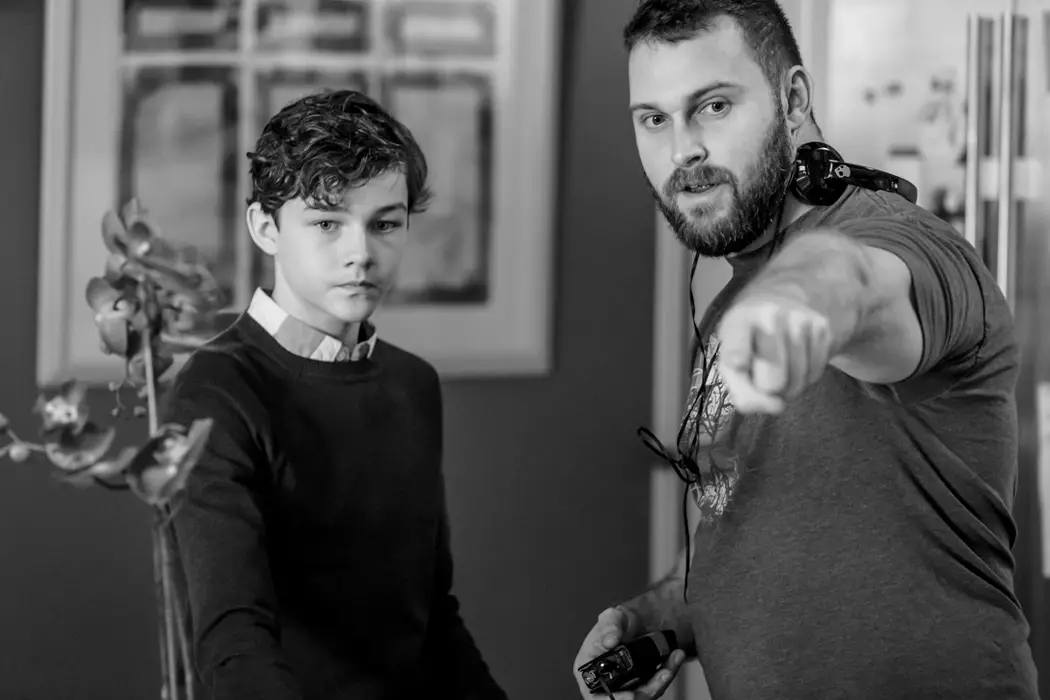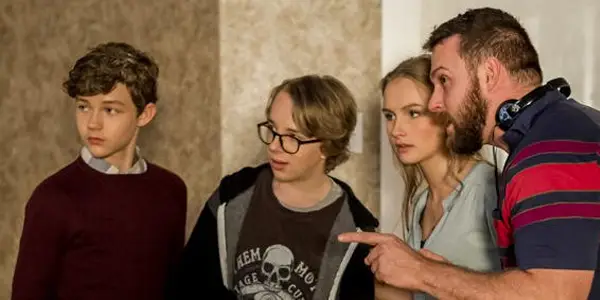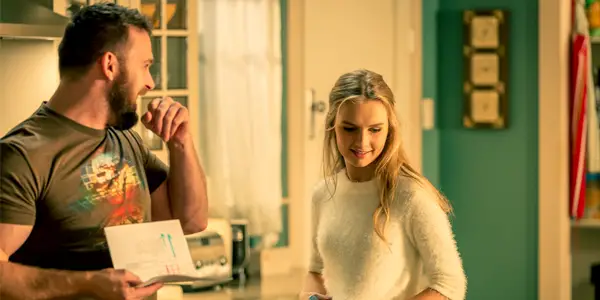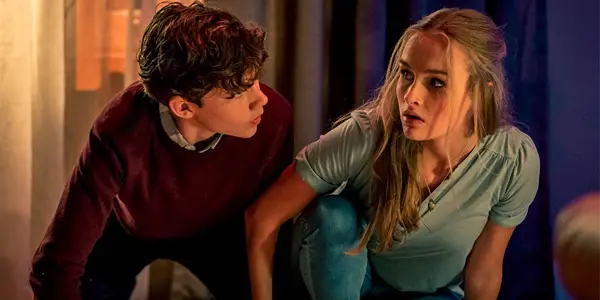“Watching Your Movie With An Audience Is Probably The Best Film School You Can Have” – Interview With Chris Peckover, Director Of BETTER WATCH OUT

Alex is a 28 year-old West Australian who has a…
Being a big fan of horror, I’m always keeping track on the new films that are hitting the festival circuit, keeping a keen eye on the titles that slowly generate continuously great reviews and hype for its eventual theatrical release. One such title that I’ve seen countless reviews and audience responses was Chris Peckover’s Better Watch Out (originally titled Safe Neighbourhood), the horror comedy follow-up to his 2010 debut feature Undocumented.
Whilst films like The Witch and The Babadook developed reputations of being great new genre entries during their pre-release festival runs, Better Watch Out created its own very unique notoriety. Not only were critics and audiences raving about it, but all advised that you avoid any spoilers, and watch it completely unaware of what’s to come. Many comments of “This is not the film I expected” (in a good way) came pouring out, delighting my interests. It’s been a great year for horror, so to see another new horror comedy doing something new with the genre and pulling off extremely well is incredibly satisfying to see.
In preparation for my interview with the film’s director and co-writer Chris Peckover, I had the chance to finally see the movie ahead of its theatrical release here in Australia. I agree with what everyone is saying – this is a terrific film and its glowing reception is absolutely deserved.
Better Watch Out centres on Luke (Levi Miller), a maturing 12 year old kid who is heartbroken that his longterm babysitter Ashley (Olivia DeJonge) is about to move away with her boyfriend. On their final night together, Luke attempts to woo Olivia, a plan that is suddenly disrupted by a nasty home invasion. To say anymore would be criminal, part of the film’s fun is to see the unpredictable narrative take the audience for a violent, but hilarious ride.
In my interview with Chris Peckover, we talked about the film’s political subtext, the script’s intricate nature and its successful festival run.
Alex Lines for Film Inquiry: I saw Better Watch Out about a week ago and I really liked it and for you, is it so relieving to see such a great reception for the film?
Chris Peckover: (Laughs) That’s a great word, relieved. Alot of people say, “Are you excited?” and I always say you know when you make a movie, I don’t know whether you ever get excited, excitement comes rarely, it’s more relief that people didn’t hate it.
Especially when you’re making a horror comedy that relies so much on these punchlines working with the audience.
Chris Peckover: Yeah horror comedies are a tough genre, but when done right, it’s really my favourite genre. It’s really hard to get the balance right, too much comedy and the horror doesn’t matter but too much horror and people are not ready to laugh.
It’s been a massive year for horror films, both financially and critically, and your film has obviously been a great contribution towards that. As a horror fan, is that something you’re quite proud of?
Chris Peckover: You’re right, the past two years have been unreal. There’s certainly a great deal of pride that I get to be a part of that, but what really excites me is where we’re going, it seems that with digital platforms becoming stronger recently, horror seems to be the genre that’s developing the most as a result of that. It also may have to do with the all these 80’s children growing up and getting to do their own homages to probably the greatest time that horror ever had, the 80’s.
Yes, especially as it allowed so many filmmakers to experiment with video as opposed to relying on the expensive nature of film.
Chris Peckover: Exactly.

It’s always interesting that every decade, horror films act as a reaction to the current political states that they were created in, films being of their time, especially with your film and Get Out. Do you think this is something that could’ve been made say 5-10 years ago?
Chris Peckover: I’m sure it could’ve gotten made 10 years ago, I don’t know if the reception would’ve been the same. It felt like a good time to talk about what the movie does, I don’t want to spoil it. John Hughes’ films were the big inspiration for me, his movies were so good because they were such an honest look at the awkward innocence of becoming a burgeoning sexual person and for sure with Better Watch Out we wanted to do a similar thing for hey – what’s it like to never having grown up without a screen?
Being as smart as you are because you have instant access to everything that you could possibly think about, what affect does that have on people who might be emotionally damaged in some way. For sure, there’s commentary in the movie, I don’t know if it would’ve landed five years ago because I don’t know if 12 year olds then were going through what they’re currently going through right now.
This has quite a smart subtext about the nature of the “nice guy” mentality, was this thematic material part of what drew you to Zack’s script?
Chris Peckover: In the original version of the script, that my writing partner Zack Kahn wrote, it was very bleak and very harrowing. I like to think of my contributions to the script as being more tonally playful and being able to add a bunch of subtext about what it’s like to be a 12 year old now. For sure, the twist of the movie drew me to the script, but getting to flesh out how that relates to today was definitely one of the reasons why I was so excited to work with him.
Between the script and your direction, there’s quite a lot of small details and some great setups and payoffs. After seeing so many big Hollywood films that completely forgo this, it’s so refreshing to see a film have all these pieces and have them mean something. Was this quite important to the creation of the film?
Chris Peckover: Absolutely. You know what they say about Chekov’s gun, never have a gun in a movie if it’s not gonna go off. Because this movie has a such a massive twist so early on, it was important to us that the film was just as fun, if not more fun, the second time around, because it’s pretty disappointing to watch a movie with a twist and it doesn’t really work. So there’s a lot of setups and payoffs that have to not seem like setups and payoffs when watching it the first time, but when watching it a second time around, you go “Oh my god”.
One of the major subversions of the movie that I enjoyed was having ‘scary kids’ on-screen that didn’t involve them being possessed or creepily British. Did you have any problems with the pre-production due to the age of the kids? Were you ever pressured to try and make them teenagers? (Even though that would defy the whole point of the film)
Chris Peckover: Yes, I was constantly asked to make them older. My feeling was, once you go past 12 years old, unless your parents are crazy, you’re not getting a babysitter for the night. It felt like the perfect balance between realistic and good enough for the film. It’s a very specific time, Luke (Levi Miller), that time when you first start to realise that you’re turning into a teenager and you start developing a different perspective on girls. Having a 15 year old discover that is pretty lame. It would’ve been a lot easier to shoot 15 year olds, budget and schedule wise, but it was one of the challenges that everyone happily undertook in order to make the movie.

Speaking of the kids in the film, you’ve managed to group together a really great selection of the young emerging Australian acting talent, such as Levi Miller, Ed Oxenbould and Dacre Montgomery. Would you say that you got really lucky, getting all these actors just before they blew up?
Chris Peckover: You know for sure, there’s always luck, when you have a bunch of stars in your film. They were drawn to the material, the film is boringly exactly like the script, I say boringly because there was no deviations from the script, it was all there on the page. I think they were drawn to it because kids their age never really get to play those roles and having the chance to play two different types of high and Levi getting to play the absurd range that Luke requires, I think that was exciting to him.
And Olivia [DeJonge], it’s funny that everyone always talks about Levi’s character, I think that if Olivia hadn’t grounded the movie as well as she did, I don’t think I would’ve been able to go as hard as I did. She brings this heart and a grounded performance to the movie that makes you believe it, because she’s in this absurd situation, but she’s reacting quite realistically, like anyone would.
I think the reason why she works so well is because she’s a character who is a badass and a great protagonist because she does badass things, the film isn’t just telling you, “Hey this girl is badass”. She’s constantly on the level in her situation.
Chris Peckover: It was really important to me, because there’s too many movies that just victimise women and have them begging and screaming, and just subjugating themselves to get out of their situations, it was so important that Ashley’s character never begged, never cried, was always toe to toe with the villain, it’s why I went with Olivia. She’s a rockstar, she’s confident, and you feel for her. She’s able to play vulnerability in a way without giving away her strengths, and she has so much talent. I was so excited to meet her and have her take this role.
It was funny to see her and Ed team up again after The Visit [M. Night Shyamalan’s 2015 found footage film].
Chris Peckover: (laughs) For sure. Everybody always asks why you picked both kids from The Visit, but what I say is, the question should be asking is to M Night, why did he use two Australian teenagers to play Pittsburgh brother and sisters?
Oh I’m sure he has his own bizarre reason for that.
Chris Peckover: Besides the fact that Australia seems to have something in the water that shoots out incredible actors every year.
We’re slowly taking over Hollywood.
Chris Peckover: Pretty quickly I reckon.
Before the film’s theatrical and VOD release, did you tour the film at all?
Chris Peckover: Yeah I travelled with the film for a couple of months in the fall, to Europe and all over the US. Then there was some quiet months where we didn’t hit many festivals, and we were beginning to figure out our distribution plan. Then things way picked up again in June/August, I was back to travelling with the film again. It was fun to see it pick up and have a reputation, so by the time the June/August screenings hit, it was fun to be there with people who knew it was gonna be good. I’m used to being the anonymous dude who surprises the hell out of people.
It’s a great position to be in.
Chris Peckover: Yeah exactly. I’ve had a lot of fun, to see the movie in different countries has really opened my eyes as to how different people react to the same material depending on their city culture.

Are you the type of guy to watch the film with the audience or is it one of things where you’ve seen it so many times that you have to take a break?
Chris Peckover: I never get tired of watching the movie with an audience, I think it’s the most important thing a director can do. If you’re an auteur who just cares about his vision, I guess that’s one thing, but I’m in the business for reaching as many people as possible. When you’re in the audience with them, it’s like being inside of an organism, you can sense when a movie is working, what lines affect people the most and it’s probably the best film school you can have, people watching your movie.
Any particular sequences that you just love to watch audiences react to?
Chris Peckover: You know, definitely after the twist, there’s a good 10-15 minutes where people are adjusting to the new frame that the movie is taking, and sometimes it’s uncomfortable, sometimes people aren’t sure whether it’s okay to laugh or not or react how they want to react. My favourite reaction is when one character, I won’t say who, arrives, because everyone always realises, no matter what city or country you’re in, they start to get the new tone, that’s why that’s my favourite part, it’s the most relieving part for me.
Speaking of the feeling of relief again, but when you’re watching the film with a new audience and the film gets it’s first big laugh, are you just like “Thank God!”
Chris Peckover: Absolutely, and sometimes it happens at a different time then another. I can say probably the most generous audiences I’ve ever seen were in Montreal, and probably the most reserved audiences I’ve ever seen were in LA. It was funny, after the movie, everyone reacts the same. But during the watching of the film, it’s kinda different, it’s less of a communal experience in LA and more of a time of quietly observing and analysing the film by their lonesome.
Just to finish off, any particular favourite Christmas horror films?
Chris Peckover: Oh, there’s really no contender besides Gremlins. I adore that film, did you know that Gremlins and Ghostbusters came out on the same day?
It’s insane isn’t it?
Chris Peckover: They’re the two greatest horror comedies of all time, for me at least, I just couldn’t believe it when I saw that. Gremlins for sure and it’s not really a horror movie, but my second film of all time is Edward Scissorhands and that’s definitely a macabre Christmas movie. So those two choices have been in my top 10 since I was a kid.
I reckon that nowadays Joe Dante is such an underrated director.
Chris Peckover: Oh, don’t even get me started.
Thanks so much for talking with me, I can’t wait to see your next film.
Chris Peckover: Absolutely, I’m working on it!
Film Inquiry thanks Chris Peckover for taking the time to talk with us.
Better Watch Out is coming out via Rialto Distribution to Australian Cinemas on the 23rd November in selected cinemas.
Better Watch Out is available now on all VOD services in North America, with an upcoming DVD/Bluray release on 5th December.
Does content like this matter to you?
Become a Member and support film journalism. Unlock access to all of Film Inquiry`s great articles. Join a community of like-minded readers who are passionate about cinema - get access to our private members Network, give back to independent filmmakers, and more.













